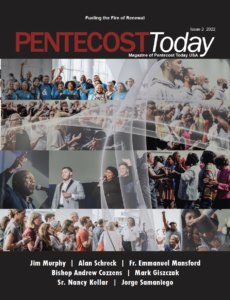Meditation and Questions for Reflection or Group Discussion
Mass Readings:
1st Reading: Isaiah 5:1-7
Responsorial: Psalm 80:9,12-16,19-20
2nd Reading: Philippians 4:6-9
Gospel: Matthew 21:33-43
Allowing the Peace of God to Overcome Anxiety and Stress
The peace of God . . . will guard your hearts and minds. (Philippians 4:7)
Isn’t the immune system amazing? It is constantly aware of the health of all the other systems in your body. Always on guard—even when you are sleeping—it wards off legions of microscopic threats. It’s only when you start to feel unwell that you remember how much you rely on it. That’s when you try to strengthen it with Vitamin C, rest, and plenty of fluids—just as the doctors say you should.
According to St. Paul in today’s first reading, the peace of God isn’t so different from your immune system. It’s your personal guardian against fear and frustration. It has divine power to subdue life’s anxieties. Even Jesus tells us that his peace is able to surpasses the world’s peace, both in its depth and in its strength (John 14:27). This is what guards your heart: this grace-filled “peace system.” It’s always with you wherever you go, always ready to help you and protect you.
You have probably noticed that when you’re at peace, ordinary problems like traffic congestion don’t infect you with anxiety. The peace of God is neutralizing stress, just as it should. But what about when bigger hazards like serious health or financial problems threaten to overtax your “peace system”? Just as you might take supplements for your body, you can increase the vitamins that strengthen your soul.
Take an extra dose of Scripture. Give your soul some rest. Take a couple of deep breaths, recall God’s goodness, and ask him to give you his peace. Recall that he is with you, that he loves you, and that he will help you. Let God’s peace quell your anxiety, and you’ll find yourself feeling more calm and more confident in the Lord.
“Lord, thank you for guarding me with your peace!”
Download this reflection with discussion questions here.
(Many thanks to The Word Among Us for allowing us to use meditations from their monthly devotional magazine. Used with permission. For more information on how to subscribe to their devotional magazine, go to www.wau.org).
Sunday, October 8, 2017
Questions for Reflection or Discussion:
- The first reading begins with a metaphor: “My friend had a vineyard on a fertile hillside; he spaded it, cleared it of stones, and planted the choicest vines; within it he built a watchtower, and hewed out a wine press. Then he looked for the crop of grapes, but what it yielded was wild grapes.” The psalm continues with the judgment and ruin that will come to the vineyard because it did not bear fruit. The vineyard is then described as “the house of Israel.”
- With these words of the psalm, how is the Lord also inviting each of us to “judge” the fruits of our life?
- What areas in your life (is there at least one) do you believe the Lord wants you to focus on to bear more fruit?
- The responsorial psalm continues the metaphor of the vineyard and the vine and the judgment that has come upon it? The psalmist then prays that the Lord would restore his vineyard and give it new life: “Once again, O LORD of hosts, look down from heaven, and see; take care of this vine, and protect what your right hand has planted the son of man whom you yourself made strong. Then we will no more withdraw from you; give us new life, and we will call upon your name. O LORD, God of hosts, restore us; if your face shine upon us, then we shall be saved.”
- In response to God’s judgment against the “house of Israel,” why do you think the psalmist turned to prayer to ask for mercy for his people? What is the psalmist promising the Lord in response to his answering his prayers?
- How does the prayer of the psalmist relate to how we are to pray for the Lord’s mercy, and how we are to respond to his mercy in our lives?
- The second reading begins with these words of St. Paul: “Have no anxiety at all, but in everything, by prayer and petition, with thanksgiving, make your requests known to God. Then the peace of God that surpasses all understanding will guard your hearts and minds in Christ Jesus.”
- Paul tells us that continual “prayer and petition, with thanksgiving” will replace anxiety with the “peace of God.” Why do you think this is so?
- Are there areas in your life where you long for more of God’s peace? How can you more fully integrate prayers and petitions to God for this peace as part of your personal times of prayer?
- Paul goes on to tell us to “think about” those things that are “true,” “honorable,” “just,” “pure,” “lovely,” “gracious,” and anything that is of “excellence” and “worthy of praise.” For then, “the God of peace will be with you.”
- In addition to how we pray, why does what we “think about” also affect our peace?
- What do you expect would be the fruit in your life from thinking more about how you can live a more honorable life—free from deceit, manipulation, and moodiness? What steps can you take to do this more each day?
- In the Gospel reading, Jesus uses a parable about a vineyard to warn “the chief priests and the elders of the people” of the importance of bearing fruit for the Lord, and the severe consequences of just selfishly bearing fruit only for themselves: “Therefore, I say to you, the kingdom of God will be taken away from you and given to a people that will produce its fruit.” Jesus also expands the parable of the vineyard by telling us just how far the landowner (God) will go to help the tenants be fruitful and faithful to him — he sends his own son who ends up dying at their hands.
- Why do you think the consequences described were so severe for living a selfish, deceitful, and fruitless life?
- Why is the fact that the landowner was willing to send his son so important to the meaning of the parable?
- How often during the day do you turn to the Lord to reflect on his great love and mercy, and what he has done so that you could have eternal life? What steps can you take to make the Lord a greater part of your day?
- The meditation is a reflection on the first reading and on the importance of God’s peace in “neutralizing stress.” It then uses the example of taking vitamins and supplements to “increase the vitamins that strengthen your soul.” For example: “Take an extra dose of Scripture. Give your soul some rest. Take a couple of deep breaths, recall God’s goodness, and ask him to give you his peace. Recall that he is with you, that he loves you, and that he will help you. Let God’s peace quell your anxiety, and you’ll find yourself feeling more calm and more confident in the Lord.”
- Why do you think the steps described above can help in “feeling more calm and more confident in the Lord”?
- What do you think will be the fruit in your life of doing some or all of these steps? Are you willing to experiment with doing them each day? If not why not?
- Take some time now to pray and thank the Lord for providing his protection and his peace. Use the prayer below from the end of the meditation as the starting point.
“Lord, thank you for guarding me with your peace!”
[The discussion questions were created by Maurice Blumberg, who is in partner relations for The Word Among Us Partners, (http://www.waupartners.org/); a ministry of The Word Among Us (www.wau.org) to the military, prisoners, women with crisis pregnancies or who have had abortions, and college students. He is also a member of the National Service Committee Council of the Catholic Charismatic Renewal (https://www.nsc-chariscenter.org/) and a member of the board of directors of the Christlife Catholic Ministry for Evangelization (https://christlife.org/). Maurice was also the founding Executive Director of the National Fellowship of Catholic Men. He can be contacted at (Enable Javascript to see the email address) mblumberg@wau.org or mblumberg@aol.com.]


 Click Here for us to pray for your intentions through our new website.
Click Here for us to pray for your intentions through our new website. 
